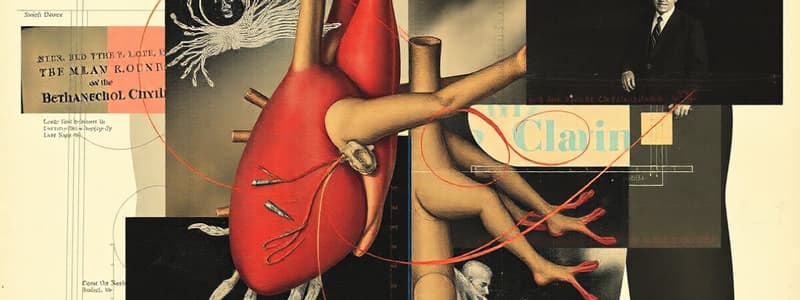Podcast
Questions and Answers
What does the parasympathetic nervous system do?
What does the parasympathetic nervous system do?
- Controls voluntary movements
- Regulates body temperature
- Slows down the body's processes and promotes rest (correct)
- Stimulate the body's fight-or-flight response
Which of the following is NOT a type of receptor that cholinergic agonists affect?
Which of the following is NOT a type of receptor that cholinergic agonists affect?
- Dopaminergic receptors (correct)
- Muscarinic receptors
- Nicotinic receptors
- Adrenergic receptors (correct)
Cholinergic agonists constrict the pupils of the eye.
Cholinergic agonists constrict the pupils of the eye.
True (A)
Which of the following is an effect of cholinergic agonists on the lungs?
Which of the following is an effect of cholinergic agonists on the lungs?
What is the primary use of Bethanechol Chloride?
What is the primary use of Bethanechol Chloride?
Which of the following is a side effect of Bethanechol Chloride?
Which of the following is a side effect of Bethanechol Chloride?
Which of the following is NOT a recommended nursing intervention for patients taking Bethanechol Chloride?
Which of the following is NOT a recommended nursing intervention for patients taking Bethanechol Chloride?
Pilocarpine is a cholinergic agonist used to treat which condition?
Pilocarpine is a cholinergic agonist used to treat which condition?
How does Pilocarpine decrease pressure in the eye?
How does Pilocarpine decrease pressure in the eye?
Flashcards
Cholinergic Agonists
Cholinergic Agonists
Substances that mimic the effects of acetylcholine by stimulating cholinergic receptors, resulting in parasympathetic nervous system activation.
Muscarinic receptors
Muscarinic receptors
Cholinergic receptors that affect smooth muscles, heart rate, and other internal organs.
Nicotinic receptors
Nicotinic receptors
Cholinergic receptors that affect skeletal muscles.
Bethanechol Chloride
Bethanechol Chloride
Signup and view all the flashcards
Cholinergic Agonist Effects (Eyes)
Cholinergic Agonist Effects (Eyes)
Signup and view all the flashcards
Cholinergic Agonist Effects (Lungs)
Cholinergic Agonist Effects (Lungs)
Signup and view all the flashcards
Cholinergic Agonist Effects (Heart)
Cholinergic Agonist Effects (Heart)
Signup and view all the flashcards
Cholinergic Agonist Effects (GI)
Cholinergic Agonist Effects (GI)
Signup and view all the flashcards
Cholinergic Agonist Effects (Bladder)
Cholinergic Agonist Effects (Bladder)
Signup and view all the flashcards
Bethanechol Chloride Side Effects
Bethanechol Chloride Side Effects
Signup and view all the flashcards
Bethanechol Chloride Assessment
Bethanechol Chloride Assessment
Signup and view all the flashcards
Bethanechol Chloride Interventions
Bethanechol Chloride Interventions
Signup and view all the flashcards
Bethanechol Chloride Overdose
Bethanechol Chloride Overdose
Signup and view all the flashcards
Pilocarpine
Pilocarpine
Signup and view all the flashcards
Study Notes
Cholinergic Agonists
- Cholinergic agonists stimulate the parasympathetic nervous system, mimicking the neurotransmitter acetylcholine.
- They affect muscarinic receptors, influencing smooth muscles and slowing heart rate.
- They also impact nicotinic receptors, affecting skeletal muscles.
Effects of Cholinergic Agonists
- Eye: constrict the pupil
- Lungs: constrict bronchioles, increase secretions
- Heart and Blood Vessels: decrease heart rate, dilate blood vessels
- Gastrointestinal: increase peristalsis and secretions
- Bladder: constrict the bladder
- Salivary and Sweat Glands: increase secretions
Cholinergic Agonist - Bethanechol Chloride
- Action: Stimulates cholinergic receptors, causing bladder contraction.
- Other effects include increased GI secretions and peristalsis, increased bronchial secretions/bronchoconstriction, and pupil constriction.
- Uses: Treat urinary retention.
- Side Effects/Adverse Reactions: blurred vision, increased secretions (lungs, GI tract, sweat), orthostatic hypotension, bronchoconstriction, hypotension, tachycardia.
Assessment
- Vital signs
- Urine output
- Medication/medical history
Interventions
- Monitor vital signs (watch for decreased BP and pulse)
- Monitor lung sounds
- Monitor GI/GU status
- Monitor and record intake/output
- Administer 1 hour before or 2 hours after meals
- Monitor for overdose (signs include muscle weakness, increased salivation)
- Antagonist: Atropine
Teach Client
- Monitor blood pressure and heart rate (report any changes)
- Rise slowly from a lying position
- Take medication on an empty stomach (one hour before or two hours after meals)
- Report muscle weakness or increased salivation
Evaluations
- Client able to empty bladder
Cholinergic Agonist - Pilocarpine
- Action: Constricts the pupil, opening the canal of Schlemm to promote drainage of aqueous humor.
- Uses: Decrease pressure in the eye in diseases such as glaucoma.
- Administered as eye drops.
Studying That Suits You
Use AI to generate personalized quizzes and flashcards to suit your learning preferences.





